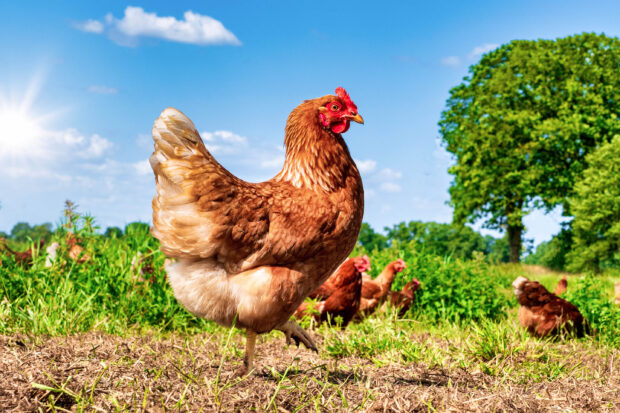Scientists say they’ve used AI to decipher the language of chickens

Free range chickens pecking in the grass, looking for food on a sunny day. (Getty images)
Deciphering the language of animals is the stuff of dreams for many people, and it could soon become reality, thanks to artificial intelligence. Researchers at the University of Tokyo claim to have succeeded in developing a system capable of interpreting the emotions of chickens on the basis of their sound signals — in other words, their vocalizations.
Being woken by the crowing of a rooster may soon take on a whole new meaning, according to the findings of a research project by scientists at the University of Tokyo. They claim to have developed a system for decoding the language of chickens, or at least some of their emotional states, such as hunger, fear, anger contentment, excitement and distress.
This draws on a model based essentially on artificial intelligence (AI), and which could lead — in the long term — to advances in many fields, such as animal welfare, veterinary medicine, poultry farming and, of course, interactions with the animal kingdom.
“In this groundbreaking study, we present a novel approach to interspecies communication, focusing on the understanding of chicken vocalizations. Leveraging advanced mathematical models in artificial intelligence (AI) and machine learning, we have developed a system capable of interpreting various emotional states in chickens,” read the opening lines of the paper, published via Research Square.
However, it is specified that this is a “pre-print” paper, ie, the work has not yet been peer-reviewed for inclusion in a scientific journal.
Distinguishing fear and hunger
The authors of this research relied on an artificial intelligence approach called Deep Emotional Analysis Learning (DEAL), a technique that enables emotional states to be understood via sounds.
“DEAL is rooted in complex mathematical algorithms, enabling the system to learn and adapt to new vocal patterns over time,” explain the researchers.
They set about analyzing the vocalizations of a sample of 80 chickens, in collaboration with animal psychologists and veterinarians. After identifying each emotion in connection with specific sounds, the scientists used this data to train their model, then subjected it to new recordings to test its accuracy and reliability.
This research highlights the potential of artificial intelligence and machine learning techniques in determining the emotional states of chickens, simply via their vocalizations. The scientists claim that their “system demonstrated an impressive accuracy rate of close to 80%, marking a significant advancement in the field of animal communication.”
This approach also reportedly made it possible to distinguish several different emotional states in poultry, including hunger, fear, anger and contentment.
“It’s a cluckin’ great leap for science!” said Prof. Adrian David Cheok, who led the research, in a social media post. “And this is just the beginning. We hope to be able to adapt these AI and ML techniques to other animals and lay the groundwork for incredible intelligence in the various animal related industries. If we know what animals are feeling, we can design a much better world for them.”